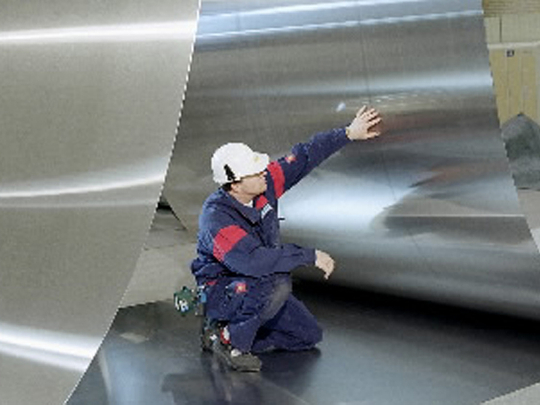
Dubai: Steel prices in the UAE have reached Dh2,150 a tonne this month after increasing every month since last December. This growth has brightened prospects in terms of the capacity of mills to operate at full capacity, according to Danube Building Materials, a company dealing in construction, building materials and shop-fitting.
Local steel suppliers are expected to reinforce their presence in the regional market as scrap prices continue to climb, costs of raw materials steadily increase, and billet supplies remain limited. Further price increases are likely in the coming months, Danube says.
The steady price increase in the region, however, is not in tandem with the steep levels at which global steel prices are rising. This indicates that the regional steel market is becoming less sensitive to global market forces.
"The local steel market required up to 400,000 tonnes of steel per month in the years prior to the downturn, but this has declined to 250,000 tonnes after the global downturn," Rizwan Sajan, Chairman, Danube Building Materials, said.
UAE steel prices climbed from Dh1,780 per tonne last November-December to Dh1,850 in January, Dh1,950 in February and Dh2,150 this month.
Comparatively, global steel (mill) prices have gone from $490 (December 2009) to $520 (January 2010) to $535 (February 2010) to $570 (March 2010). Latest estimates indicate that a price of $600 is imminent.
The region's indifference to the rate of increase in global prices is partly due to weak demand, as a result of some major projects in the Middle East being delayed or cancelled.
Further, liquidity remains tight, with most contractors and developers unable to commit to immediate payments to suppliers in the region.
According to Mesteel.com, rebar prices grew $27 in recent months. The outlook for steel in India continues to be "positive" for 2010 with consumption expected to grow between 6-9 per cent this year, according to Karvy Comtrade.
Sajan said: "The increasing role played by GCC-based steel suppliers, which has curbed the flow of Turkish steel into the country, is also an indicator of the increasing growth potential for the regional industry. We remain optimistic that steel prices in the region will increase and reach their ideal level, which is somewhere around Dh2,300 to Dh2,400 per tonne.
Capacity
"This will provide a boost to the mills, which have been affected by the recession to gain full operation capacity and thereby stabilise the market."
At present, top UAE-based suppliers Emirates Steel Mills and Qatar Steel Corporation dominate the regional supply chain, delivering a combined 175,000 tonnes (125,000 tonnes and 50,000 tonnes, respectively), to the UAE.
With scrap traders holding on to existing stockpiles and a lower collection of scrap over the past few months, steel prices in the region have increased by almost 12 per cent in the last month.
While billet supplies remain another issue in the region, Danube is confident that the current steel prices are a realistic reflection of the market and bode well for the remainder of the year.
Sajan said: "The global market has seen steel prices drop to an all-time low of $390 back in 2008, while prices in the region had hit the bottom price of Dh1,750 per tonne in 2009.
"During these periods, the steel industry has had major difficulties coping with the closure or slowing down of mills.
"The increase in prices we are monitoring in the UAE and the rest of the region is suggestive of positive developments."











